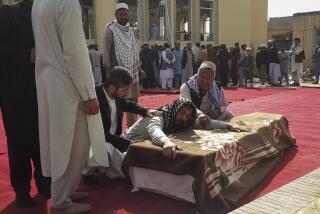Rumsfeld Doesn’t Request Bangladesh Forces for Iraq
- Share via
DHAKA, Bangladesh — Defense Secretary Donald H. Rumsfeld on Saturday made the first visit here by an American defense chief in decades, but he stopped short of asking this Muslim nation that is one of the largest contributors of troops to the United Nations to send soldiers to Iraq.
Despite the public furor over his visit and an unrelated general strike by political opposition groups, Rumsfeld’s motorcade swept through streets cleared of traffic. In contrast to a day earlier -- when demonstrators from more than 20 political and Islamic parties gathered in Dhaka, the capital, and chanted “Rumsfeld is a war criminal!” -- there were no signs of protest among the hundreds of Bangladeshis who lined the route.
Speaking to reporters traveling with him on the eve of the 60th anniversary of D-day, Rumsfeld compared the Allied invasion in 1944 to the war in Iraq, which he said has taught him the value of perseverance.
“If you think of the path that Japan took and the number of years that it took to go from where they were to what they are today and the free democratic and vibrant economy ... it is a path that free people ultimately have to walk along, and there are potholes in the road and there are stumbles. So, too, with Germany. Now if something’s worth doing, it’s worth persevering. What we’re doing in Iraq and Afghanistan we’re doing with 24-hour news, seven days a week, with a focus on every single thing that isn’t perfect,” Rumsfeld said.
“People thought that maybe it wasn’t possible for those countries to get from where they were to where they are today. And yet there were people who said, ‘It is possible.’ And they were willing to persevere,” the secretary said.
Rumsfeld and Bangladeshi officials said that they discussed Iraq and Afghanistan but that he did not ask for troops. Bangladesh, a moderate, predominantly Muslim nation with 7,000 soldiers deployed in 10 U.N. missions, has made it clear that it wants to send peacekeeping forces under United Nations auspices only.
“Our position has never changed,” Foreign Minister M. Morshed Khan told reporters. “We always have worked under the blue helmet, and also we always said we’ll go to any country at the call of that country and when we know we are welcome, to mitigate the sufferings of the people.”
Pentagon officials have urged Islamic nations to join in the reconstruction of Iraq to help dispel the image of Westerners occupying an Islamic nation. Having sent troops to Liberia, Congo, Sierra Leone, Kosovo and Kuwait, Bangladesh has extensive experience in peacekeeping and demining operations and fits the bill nicely, a defense official said, speaking on condition of anonymity.
But public opinion is sharply divided here, where eight in 10 of the country’s 140 million residents are Muslims.
Outside the Pan Pacific Sonargaon Hotel where Rumsfeld met Saturday with Khan and Prime Minister Khaleda Zia, assailants set fire to a packed double-decker bus late Friday, killing nine. No one claimed responsibility for the attack. A U.S. official, speaking on condition of anonymity, said the fire apparently was related to the general strike that began Saturday.
Members of Rumsfeld’s entourage arrived in their rooms, where they received a letter from the State Department warning them not to leave their hotel. Bangladesh, a crowded and impoverished Islamic enclave the size of Iowa, lies between Myanmar and India.
At an event that Rumsfeld attended Saturday morning in Singapore, Cambodia’s co-defense minister urged the secretary to persevere in Iraq despite recent outrage over the abuse of Iraqi prisoners in U.S. custody, saying, “Let’s not have the lesson of Cambodia repeated in Iraq.”
Recalling how the Khmer Rouge slaughtered more than 1 million Cambodians after the United States stopped bombing the group’s havens in Indochina, the co-defense minister, Prince Sisowath Sirirath, spoke softly during a question-and-answer session after Rumsfeld’s speech to the Shangri-La Dialogue, a regional security conference sponsored by the International Institute for Strategic Studies.
“Speaking purely from the experience I had in my country,” he said, “barely two years after the announcement of halting of the bombing in Indochina by U.S. forces, Cambodia, South Vietnam and Laos collapsed. So I am against those who call for the United States to [set] a timetable for U.S. forces and its allies to withdraw from Iraq.”
More to Read
Sign up for Essential California
The most important California stories and recommendations in your inbox every morning.
You may occasionally receive promotional content from the Los Angeles Times.













